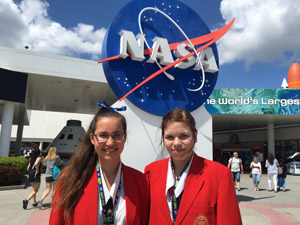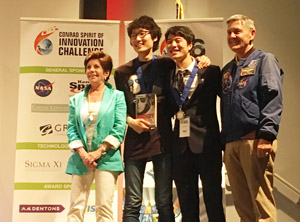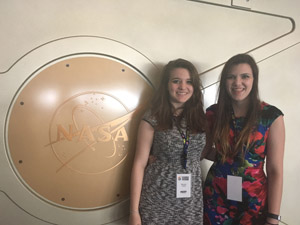June 14, 2016
 Olivia Hutley, 16, of Australia was at NASA’s Kennedy Space Center Visitor Complex in April, holding an ancient-looking book just given to her from the personal library of astronaut Pete Conrad. She was so proud of it that she knew she would always keep it. After traveling half way across the world, she had overcome her nerves to give a presentation with her classmate, Kelsey Matuschka, 16, about a mobile app they had developed with two other classmates. Hutley learned how to use computer code to develop it.
Olivia Hutley, 16, of Australia was at NASA’s Kennedy Space Center Visitor Complex in April, holding an ancient-looking book just given to her from the personal library of astronaut Pete Conrad. She was so proud of it that she knew she would always keep it. After traveling half way across the world, she had overcome her nerves to give a presentation with her classmate, Kelsey Matuschka, 16, about a mobile app they had developed with two other classmates. Hutley learned how to use computer code to develop it.
They were competing at the 2016 Innovation Summit, the finish line of the Conrad Spirit of Innovation Challenge. The challenge is an eight-month entrepreneurial contest run by the Conrad Foundation. The contest asks high school students to design products or services that would benefit humanity.
 Sigma Xi, The Scientific Research Society has supported the Conrad Spirit of Innovation Challenge since its beginning 10 years ago. The Society is one of the program’s technology sponsors, and its members represent the largest group of judges who evaluate the teams’ projects before the summit.
Sigma Xi, The Scientific Research Society has supported the Conrad Spirit of Innovation Challenge since its beginning 10 years ago. The Society is one of the program’s technology sponsors, and its members represent the largest group of judges who evaluate the teams’ projects before the summit.
More than 90 high school teams came to the summit, whittled from 140 teams that submitted projects. They competed in one of four categories: aerospace and aviation, cyber technology and security, energy and environment, and health and nutrition. Before arriving, teams created portfolios with business and technical plans for their products. Some even made prototypes.
 Soon after the summit kicked off, the top five finalist teams in each category were announced based on the merit of their portfolios. The finalists then gave Power Pitches, which are presentations they might give to investors, on stage in front of more than 300 students, parents, and coaches with the hope of qualifying for the top prize: being named a Pete Conrad Scholar. The scholars receive a market research assessment, a plan to continue product development, a medallion, legal services worth $5,000 to file a patent application, and one year of dues paid for an associate membership in Sigma Xi.
Soon after the summit kicked off, the top five finalist teams in each category were announced based on the merit of their portfolios. The finalists then gave Power Pitches, which are presentations they might give to investors, on stage in front of more than 300 students, parents, and coaches with the hope of qualifying for the top prize: being named a Pete Conrad Scholar. The scholars receive a market research assessment, a plan to continue product development, a medallion, legal services worth $5,000 to file a patent application, and one year of dues paid for an associate membership in Sigma Xi.
Additionally, teams that did well in a preliminary Power Pitch round were invited to give their presentations on stage for the chance of winning certificates and trophies.
In between Power Pitches, speakers told the teams that their talents were needed for future missions to Mars and in the medical industry, how to leave positive impressions, and the importance of being open for—and preparing for—future opportunities. Students were invited to have a voice in their own education.
“You can actually affect the world,” said Nancy Conrad, chairman and founder of Conrad Foundation, which runs the challenge in honor of her late husband, astronaut Pete Conrad.
She gave Hutley the book from Pete’s library after Hutley’s team was named the Power Pitch winners for the health and nutrition category. Their idea was a smartphone app that uses color to encourage a user to have better sleep and moods.
“We can go so much further, we believe in the product,” said Hutley.
Photo captions
Top photo: Kelsey Matuschka, left, and Olivia Hutley of Australia were the Power Pitch winners for the health and nutrition category in the 2016 Conrad Spirit of Innovation Challenge's Innovation Summit. The summit was held in April at NASA's Kennedy Space Center Visitor Complex.
Middle photo: Nancy Conrad, left, stands with Pete Conrad Scholars Dongyoon Shin, 18, and Dongsei Park, 17, of South Korea. Shin and Park logged more than 1,000 hours on making an improved space helmet. On the right is Bob Cabana, former space shuttle commander and director of NASA’s Kennedy Space Center.
Bottom photo: The summit’s masters of ceremony were sisters Shannon and Mikayla Diesch, who were named Pete Conrad Scholars in 2010 for a nutrition bar they made for astronauts. The bars actually went into space.
More on the Conrad Spirit of Innovation Challenge: http://www.conradchallenge.org/